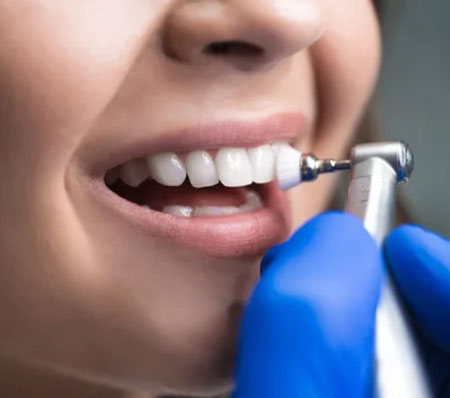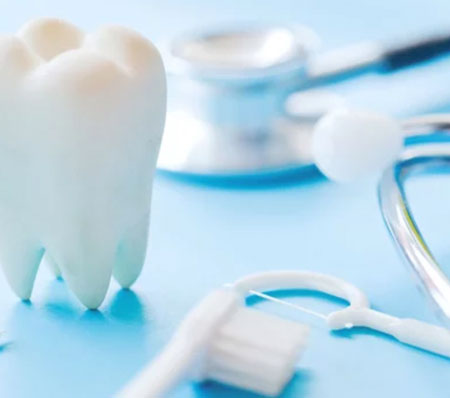
Dental Cleaning —
Is it worth it?
The answer is most definitely YES! Routine dental cleanings are KEY to maintaining a beautiful and healthy smile. To learn WHY, scroll on!

"Beautiful office. Friendly staff. Dr. Hernandez is wonderful. Always a great experience for our whole family. I highly recommend."
— Dawn M.
What you should know
about a
Dental Cleaning
Even if you are exceptional at daily brushing and flossing and you don’t have any dental problems or mouth pain, you should still come in for a regular professional teeth cleaning. Doing so helps prevent excessive plaque buildup and decay as well as gives the dentist an opportunity to examine your mouth for any problems that might be difficult to catch by the untrained eye.
Important questions to consider when scheduling a teeth cleaning in Viera, FL
Benefits of a Teeth Cleaning from HD Dental


What happens during a Teeth Cleaning?
Depending on the health of your mouth and the length of time since your last visit with a dentist, your cleaning may involve any of the following services:
Scaling - A routine dental cleaning typically begins with scaling. Scaling is the process of removing plaque and tartar from all surfaces of the teeth. With an electric scaler, hygienists are able to perform dental cleanings with more efficiency and in less time than traditional scaling done by hand, while also maximizing comfort for patients.
Polishing - After scaling is performed, polishing completes the cleaning process. Polishing is done by attaching a small rubber cup to a dental drill and dipping the cup in an abrasive polishing compound, which often feels like a gritty toothpaste and can come in a variety of flavors. This compound is then used to clean the teeth and is completely safe if swallowed. As the gritty compound rubs the teeth it smooths out the surface of the tooth, minimizing the chance of future plaque buildup.
Flossing - Your dental hygienist may want to floss your teeth. Flossing during your cleaning may seem unnecessary if you are a routine flosser at home, but it allows them to take a deeper look at your gums and make note of any bleeding or other potential problems. It is also nice to have a professional floss your teeth so any leftover debris from the scaling and polishing processes is sure to be removed.
Rinsing - Once your teeth have been scaled, polished and flossed, your hygienist will rinse your mouth out with water to get rid of any remaining debris.
Fluoride - It is likely that a fluoride treatment will be offered following your dental cleaning. Fluoride varnish is a highly concentrated form of fluoride, a mineral that strengthens the outer coating of the tooth. Hygienists apply fluoride varnish on the surface of the tooth to help prevent tooth decay or keep it from getting worse. It’s typically applied with a swab or brush or even placed in a tray that is held in the mouth for several minutes. Fluoride is a safe and common preventative treatment.
X-rays - Depending on your dental history, x-rays may be necessary before or after your teeth cleaning. X-rays are typically taken once a year to monitor changes in the teeth. People who are at risk for decay or gum disease may require x-rays more often than once a year. Most insurances typically cover yearly x-rays, but it’s always important to check your insurance benefits before your visit.

What are the benefits of a Teeth Cleaning from HD Dental?
At HD Dental, our teeth cleanings are comprehensive and thorough. Throughout the cleaning process, we take the time to review your goals and concerns, if any, for your smile. Our hygienists who perform the cleanings work in a gentle manner and at a pace that is comfortable for you. We do everything in our power to help you feel relaxed and comfortable as we clean your teeth.
How often should I get my teeth cleaned?
Patients who practice good oral hygiene habits and have a healthy mouth only need a teeth cleaning every 6 months.
High risk patients (such as patients who regularly get cavities or have had gum disease) should come to the dentist for a routine cleaning every 3 months.
Is it safe to have a dental cleaning during the Covid-19 pandemic?
Yes. Routine dental care plays a major role in your overall health and should only be delayed in rare circumstances. Now that we have a better understanding of the coronavirus and how to protect against it, we are able to provide a safe environment for your visit to the dentist.
How do I know if I need a teeth cleaning or visit to the dentist sooner than 6 months?
Visiting the dentist every 6 months for a routine checkup and cleaning is key to ensuring good dental health. In some instances, a visit to the dentist may be necessary sooner. Here are several questions to ask that may indicate that you need a visit to the dentist sooner rather than later:
- Are you experiencing tooth or mouth pain?
- Have white or brown spots appeared on your teeth?
- Do your gums look red, swollen or irritated?
- Are your teeth sensitive to hot or cold foods and drinks?
- Do you have any loose teeth that are concerning to you?
- Are your teeth impacted, damaged or broken?
If you answered yes to any of these questions, please give us a call, and we’ll help you determine if an appointment is necessary for your smile!

6 ways to prepare for your appointment
To help your trip to the dentist run smoothly, especially if it’s your first visit, follow these six steps!
How do I prepare to visit the dentist?
- Confirm Your Dental Appointment- Call the dentist a day or two before your appointment (if they haven’t already reached out to you) to confirm your appointment time. It’s always better to be prepared than to miss your appointment.
- Arrive Early- We ask that you please arrive 10-15 minutes early to fill out necessary paperwork. These forms will help our dental team become familiar with your medical and dental history and help us know how to best meet your individual needs.
- Bring Your Insurance Card- Most Insurances cover between 80% to 100% of basic preventive services. Come prepared with your insurance card and an understanding of your coverage so you can take advantage of your benefits. If you need help figuring out your insurance coverage, please don’t hesitate to call.
- Payment- Payments or co-pays are due at the time of service. We accept cash, checks and most major credit cards.
- Write Down All Questions or Concerns- If you have any questions or concerns for your dentist, write them down before hand so you remember to ask during your appointment. Having questions ready can ease any anxiety or stress.
- Be Open and Honest- We understand that it can be difficult to visit the dentist. Whether you are anxious, embarrassed or simply unsure, please express your concerns and be honest with us about your oral habits. The more we know, the better we can help you.
